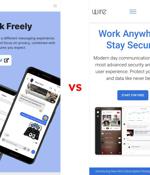Security News

Google in the next few days plans to begin testing fenced frames, a proposed web API to help its Privacy Sandbox ad technologies meet commitments to privacy of a sort. Fenced frames are designed to take the place of inline frames, or iframes, for specific scenarios like delivering interest-based ads without betraying interest data to the web page in which they're embedded.

Google has officially released the first developer preview for the Privacy Sandbox on Android 13, offering an "Early look" at the SDK Runtime and Topics API to boost users' privacy online. "The Privacy Sandbox on Android Developer Preview program will run over the course of 2022, with a beta release planned by the end of the year," the search giant said in an overview.

Instead, you can turn to a lesser known but more privacy-minded browser, and one candidate is the Ghostery Dawn browser. Made by the people behind the Ghostery browser privacy extension, Dawn tries to limit the information that is typically monitored and recorded when you use one of the major browsers.

Transcend released the results of its latest survey of technology decision makers, which assessed their readiness for Apple's in-app deletion requirements for iOS apps that offer account creation. Less than a quarter of respondents understand the full scope of Apple's in-app deletion requirements, despite clarifications from Apple.

A group of academics has designed a new system known as "Privid" that enables video analytics in a privacy-preserving manner to combat concerns with invasive tracking. "People are already worried about location privacy with GPS - video data in aggregate could capture not only your location history, but also moods, behaviors, and more at each location," Cangialosi added.

In the case of computer science professor Douglas Leith, this truth is that Google has been taking detailed notes of every telephone call and SMS message made and received on the default Android apps. In brief, Leith set up a man-in-the-middle attack on his phones to crack open the data links' HTTPS/SSL encryption.

Signal vs. Wire: Compare messaging app privacy and security We may be compensated by vendors who appear on this page through methods such as affiliate links or sponsored partnerships. Both Signal and Wire offer stronger security measures than system default messaging solutions, such as Google Messages, Apple's iMessage or Microsoft's Skype.

Hot on the heels of Microsoft's report card from the Dutch department of Justice and Security comes news of rival messaging platform Zoom receiving a nod via a renewed Data Protection Impact Assessment. Zoom's end to end encryption on all chats and meetings received a thumbs-up, as did a commitment from Zoom to process all personal data exclusively in European data centres by the end of the year.

The report focused on the actions that consumers took in 2021 to exercise their privacy rights under the CCPA. This includes the right to access their data, delete their data, and stop the sale of their data to a third-party. The company then compared 2021 data with that from 2020, which was CCPA's first year, in order to evaluate data privacy trend lines.

Data privacy regulations are designed to give consumers more transparency into and control over how their data is collected, shared and used, especially as more consumers grow concerned about how their data is accessed and used by big data companies. As more data privacy regulations go into effect, companies will face pressure to ensure they are collecting, using and sharing individuals' information responsibly, while remaining compliant with constantly changing regulations and still being able to efficiently reach customers and prospects for sales and marketing purposes.